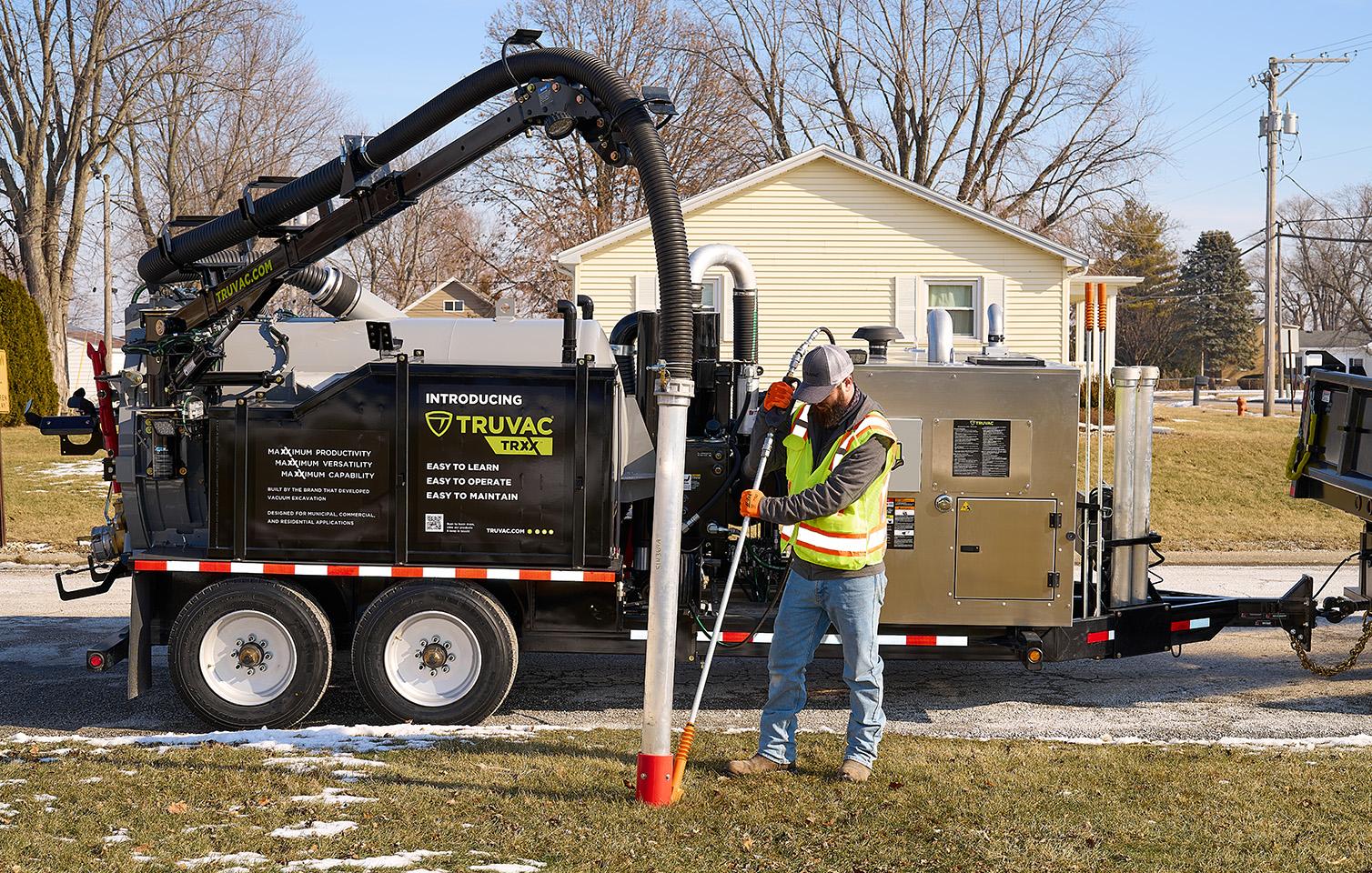
Colorado’s excavation contractors face quite a few challenges on the job. Diverse terrain and complex infrastructure ownership can quickly become a burden to excavators when starting a dig.
With 273 active municipalities, including 198 towns, and 73 cities, safe digging standards aren’t always linear, which somewhat handcuffs contractors when planning a project.
Still, Colorado is responsible for more than their fair share of the nearly quarter million reported instances of damage, according to the 2022 DIRT report.
77% of the nation’s no-call damages attributed to excavation professionals, the CGA urges better communication between contractors and infrastructure owners.
As a leader in infrastructure-maintenance equipment and training, the Joe Johnson Equipment team is focused on equipping homeowners, municipalities and contractors with great resources to help keep infrastructure jobs safe and compliant.
We developed this guide as a comprehensive step-by-step resource on how to dig in Colorado, wherever your next excavation job is.
Safe Digging for Contractors: The Know What’s Below Protocol
1- Clearly mark your job site
2- Contact Colorado 811 or submit a ticket to iDig
3- After the ticket is submitted, USIC and/or utility providers are contacted and will mark your job site
4- In the case of a private line, contractors will need to contact the appropriate party
5- Confirm all lines are marked according to the 811 supplied list
6- Dig carefully around marked locations – Colorado’s legal tolerance zone is 18 inches, hand digging is strongly recommended
These steps should be used as a reference along with more detailed guidelines set by state officials, municipalities, and infrastructure owners.
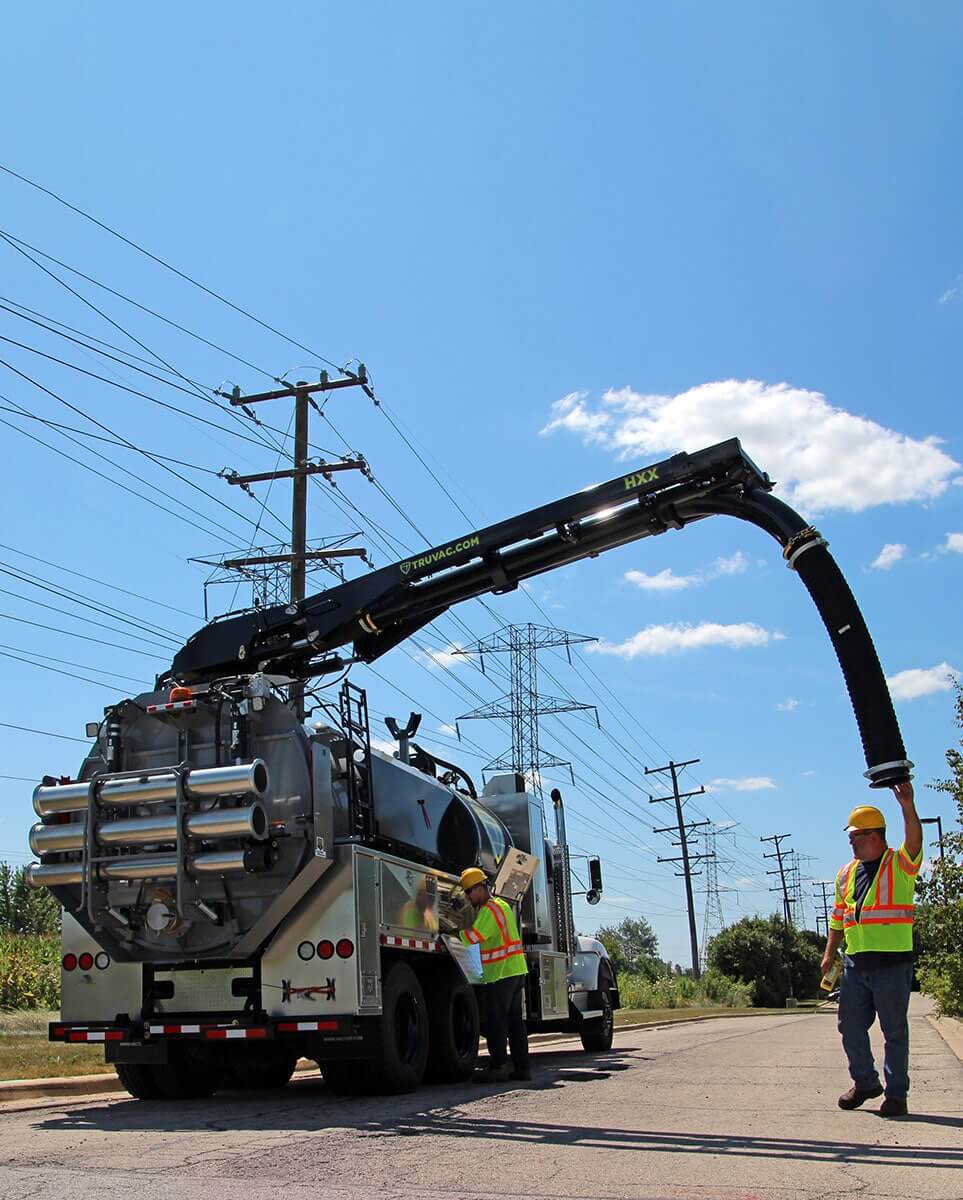
Colorado 811 – The Excavator’s Window to Safe Digging
Colorado 811’s one-call notification system aims to improve communication between excavators and facility owners.
Before beginning any digging project, contractors need to contact Colorado 811 to request utility locates. Compliance is mandatory so make sure you dial in to avoid potential fines.
- Contact Colorado 811 and detail the location and specifics of your excavation project.
- Locate Requests are called in either by calling 811 directly or utilizing the online platform – Ticket Express or Web Ticket Entry.
- Excavation covers any operation involving earth movement or removal, such as auguring, trenching, or tunneling.
- 811 then gathers geographic details to map your excavation area so they can contact the appropriate owners.
- Colorado 811 is a communication hub, not all facility owners are connected to the service. Make sure you contact any private infrastructure owners to request locates from them.
Directly contact facility owners and operators for issues like billing inquiries, service changes, or outages, as Colorado 811 doesn’t handle these matters.
Types of Requests Contractors
Can Make to 811
-
Normal Request:
- Make a locate request two business days before excavation.
- Facility owners and operators have to respond within two business days.
- Recommended Facility Owner/Operator Response:
- Mark all known facilities within the excavation area by the end of the second full business day or communicate the all-clear.
- Honor due dates for Multiple Day Requests.
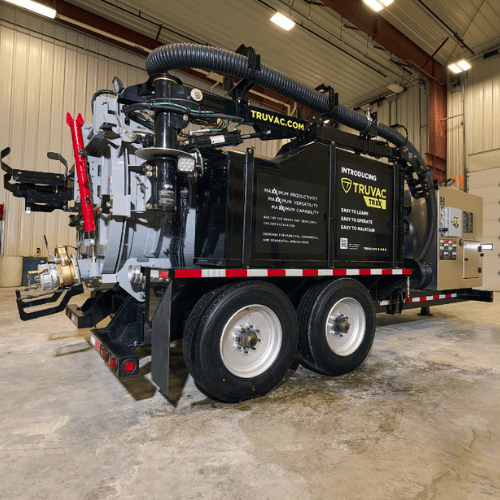
-
Emergency Request:
- Immediate excavation is necessary to prevent loss of life, property damage, or damage to underground facilities.
- Facility owners and operators need to field these as priority requests.
- The excavator needs to be present on site within the specified time frame.
- Processed 24/7.
- Recommended Facility Owner and Operator Response:
- Respond to business-hour emergencies within one hour.
- Respond to after-hours emergencies within two hours.
- If unable to meet response time, provide an estimated time of arrival
-
Damage Notification Request:
- For damaged or exposed underground facilities.
- The excavator needs to get in touch with affected facility owners and operators to mitigate damages.
- Prioritized over other normal Locate Requests.
- Gas line damage with escaping gas requires evacuation and contacting 911.
Safe Digging Practices for Contractors in Colorado
Damage to 478 utility lines in 2023 resulted in penalties of over $500,000 in 2023. Contractors need to approach each excavation job with care and compliance.
Familiarization with local utilities: Contractors need information about the location and depth of underground facilities before excavation begins.
State excavation laws: Complying with Colorado’s excavation regulations, including providing advance notice to underground facility owners is a crucial first step when starting a dig.
Contractors can face severe penalties if they fail to follow municipal guidance and follow proper procedures. Violators may face fines of up to $5,000 for an initial violation and up to $75,000 for each subsequent violation within twelve months.
Usually, when a contractor breaks the rules, the Safety Commission is encouraged to consider remedial measures for violators.
Civil penalties and regulations for underground facility owners, operators, and excavators in Colorado:
- Owners and operators who fail to join the 811 notification association can carry a $200 civil penalty.
- Excavators need to alert the notification association before commencing any excavation activity. Failing to notify the association before an excavation is another $200 civil penalty.
- Damaging an underground facility during excavation carries a much steeper penalty from $5,000 to $25,000, with potential escalation for repeat offenders
- These penalties are combined with any other legal or equitable remedies available.
- When determining liability or damages, courts or arbitrators will consider a few factors like the nature of the violation, culpability, prior violations, and cooperation with regulations.
A fiber internet installation project in Colorado Springs was responsible for 755 incidents of damage to water, electrical, and natural gas lines in the past year.
Authorities cited negligence in at least 57 of the reported cases, a pretty compelling use case in the journey to creating responsible digging practices from the get-go.
Underground Damage Prevention Safety Commission
On May 25, 2018, Senate Bill 18-167 was signed into law by Governor Hickenlooper, establishing the Underground Damage Prevention Safety Commission.
The Safety Commission’s responsibilities include:
- Recommending best practices, training, and policies to enhance public safety. They’re also tasked with keeping 811 cost-effective and efficient.
- Reviewing and mediating violations to suggest the appropriate actions and fines.
The UDP is an important extra layer of oversight that helps to continuously improve processes and enhance contractor and facility owners’ communication.
Guidelines for Preparing To Call
By helping create a level of synergy between themselves, 811, and infrastructure owners, contractors can make a huge difference, and it starts at the locate request.
Remember, trained agents are always available to assist and will ask essential questions to better process each request.
We’ve laid out the pertinent info you need to have ready below for calls to Colorado 811.
Information to have ready for your call:
- Work to be Completed
- Mention the entity for which the work is being done, whether a company or homeowner.
- Type of Work
- Specify the type of work to be done and include detailed information about the excavation purpose.
- Explosives (Y/N)
- Gas facility regulations require surveys near blast sites, so disclosing the use of explosives aids in compliance.
- Directional Boring (Y/N)
- Directional boring indicates the use of specialized technology for drilling.
- County
- County and city details are crucial to identify the work site and notify relevant facility owners and operators.
- Site Address
- If a street address is unavailable, give them the intersection.
- City
- Street
- Nearest Intersecting Street
- Distance Between Address or Excavation Site and Nearest Intersecting Street
- Accurate information about the nearest intersecting street helps to pinpoint the excavation site.
- Marking Instructions
- Detailed instructions are required for marking the proposed excavation site, including specific areas like “front of lot” or “50-foot radius of the intersection.”
- It’s the excavator’s responsibility to ensure site access.
- Use cardinal directions instead of relative terms like right or left when describing directions.
- For street excavations, specify marking instructions such as “from curb to curb” or “from center line to lot line.”
- Multiple tickets may be necessary for sites involving multiple areas.
- Definitions of terms like center lane, cul-de-sac, or median can help accurately describe the excavation area.
- Property-related terms like property line and easement should be used accurately.
- Parkway refers to the area between pavement and sidewalk or property line.
- Right of way delineates dedicated street areas.
- Ensure a clear description of the site for effective marking.
- Agents won’t accept vague descriptions or locate requests within legal limits.
***Marking instructions are quite comprehensive – please take a look at the full guide here.
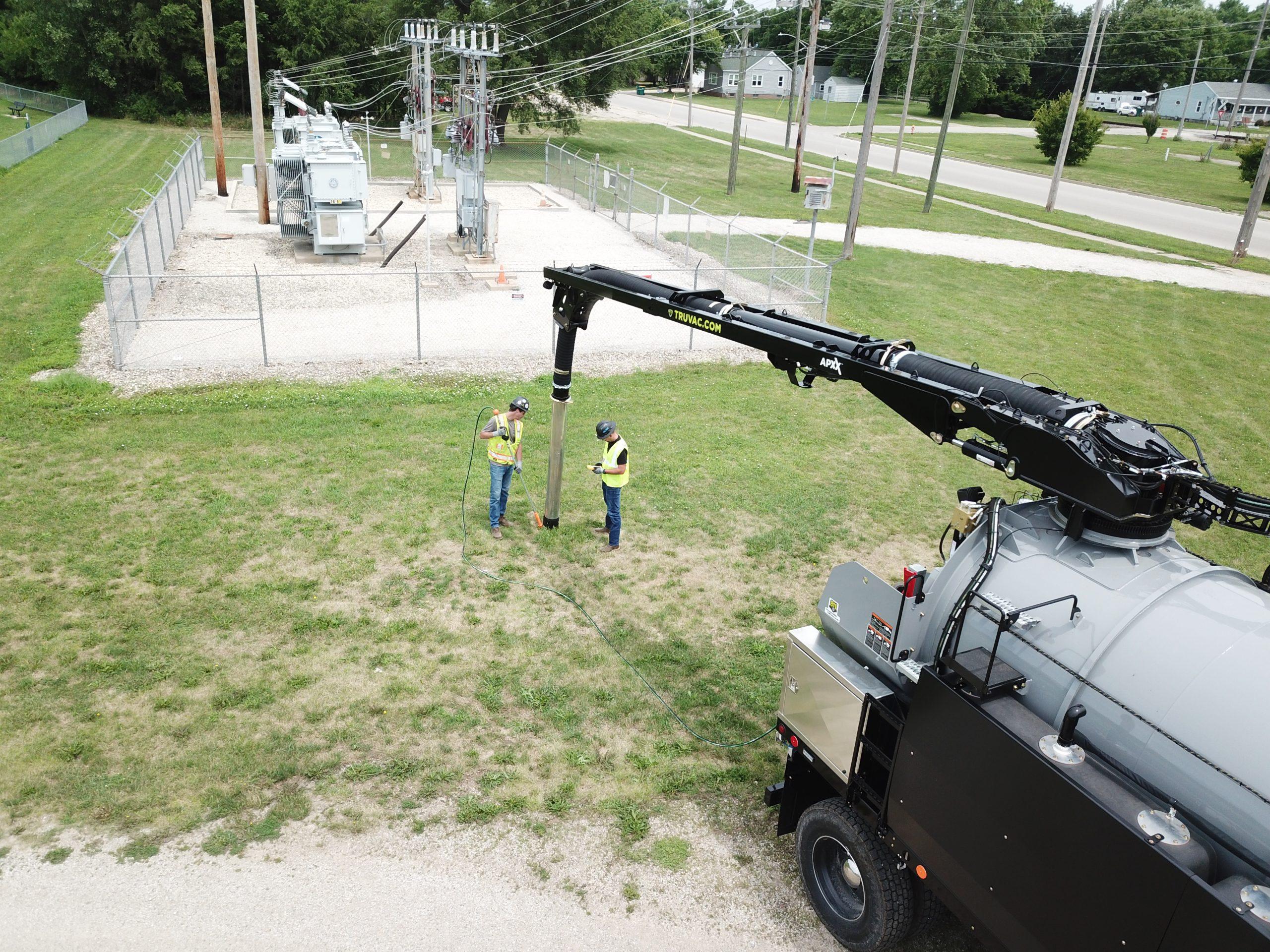
On-site Locates: Know the Colors
Utilities are color-coded based on type. The state uses a uniform system for marking. Identification is easy because of specific color codes that can be marked with paint, flags, or both.
White: Proposed Excavation
Pink: Temporary Survey Markings
Red: Electric
Yellow: Gas, Oil, Steam
Orange: Communication, CATV
Blue: Potable Water
Purple: Irrigation, Reclaimed Water, Slurry Lines
Green: Sewer
Tolerance Zone
Colorado’s tolerance zone is 18”, within the parameters, contractors need to either hand-dig the area around the locate or if permitted, use hydro-excavators to displace the remaining earth.
Homeowners’ Cheat Sheet to Safe Digging
This mini-guide will help homeowners start their projects on the right foot.
Contact Colorado 811: Call Colorado 811 before digging to request utility locates and avoid damaging underground utilities.
Understand utility markings: Homeowners need to know the meaning of utility markings and exercise caution when excavating near marked areas.
Step-by-Step Guide:
- Initiate contact with 811 before starting any excavation.
- Visit co811.org or dial 811 to request assistance.
- Allow sufficient time for the process. Make your request at least three business days before the planned digging activity.
- Wait for utility locators to mark the underground lines before digging.
- Respect and preserve the marks provided. They remain visible for up to 30 calendar days.
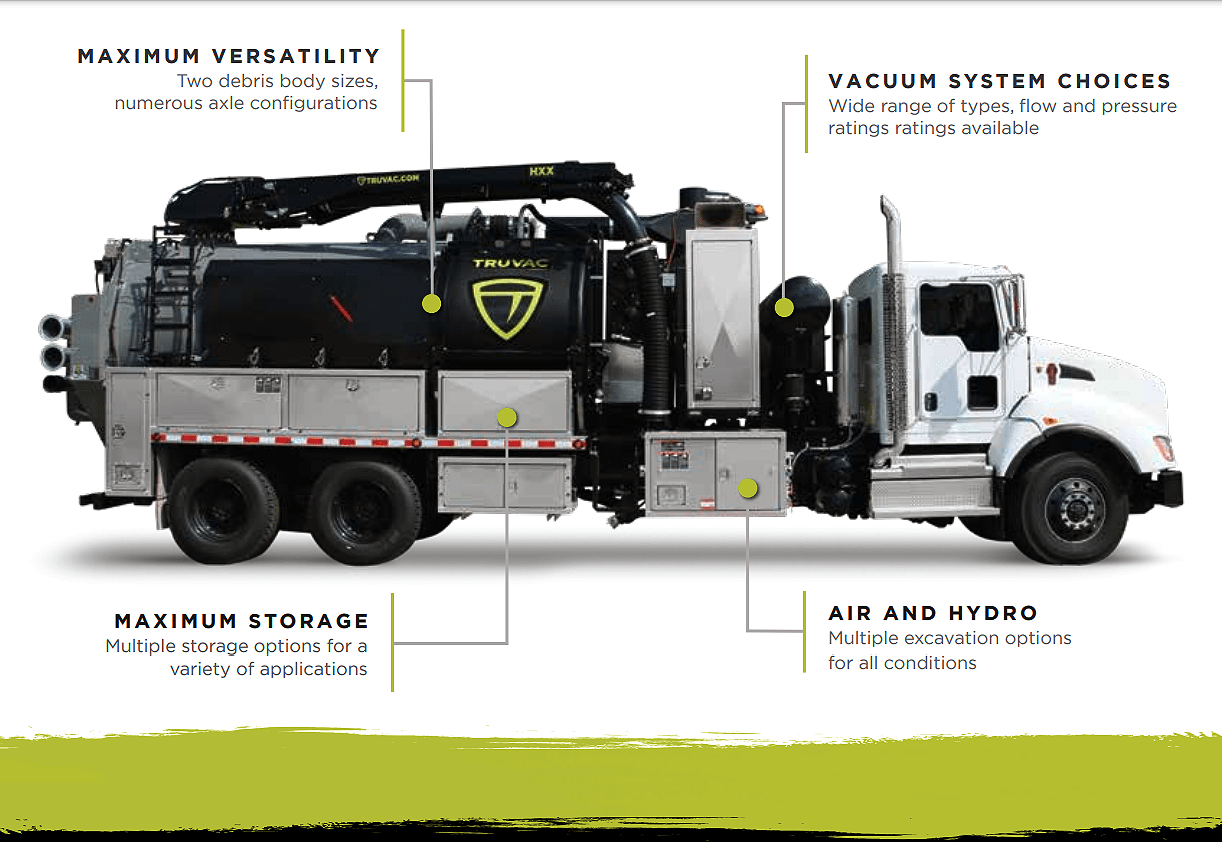
Truvac HXX – This full-sized beast was developed from
the ground up—literally.
Hydro-Excavation and a No-Dig Solution for Safety and Precision
Hydro excavation eliminates the need for mechanical or hand excavation. The high-pressure water jets and powerful suction safely expose underground utilities without disturbing the earth. They also have an excellent track record for worker safety and in reducing on-site incidents.
Joe Johnson Equipment (JJE) offers advanced hydro excavation trucks and trailers equipped with innovative features like Vactor’s DIGRIGHT Technology.
Applications and Advantages of Hydro Excavation
- Hydro excavation is used for drilling holes, potholing, and pipe location.
- It significantly reduces accidents compared to traditional excavation methods, ensuring worker safety and environmental protection.
- Minimally disrupts the surrounding area reduces restoration costs and preserves natural habitats.
- Hydro excavation completes jobs faster with fewer crew members, which reduces labor costs.
- In urban or commercial settings, hydro excavation minimizes disruption to traffic and commerce, making it a cleaner and more efficient choice.
Technological Advances in Safe Digging
Ground Penetrating Radar (GPR) and Hydro-Excavation are assets worth investing in as they lead the charge in helping contractors keep costs down and reduce the number of incidents.
Advantages of Ground Penetrating Radar
GPR, or ground-penetrating radar, can locate infrastructure objects underground and inside concrete. It’s a cost-effective and non-invasive method of surveying, providing subsurface information before excavation begins.
Perks of GPR:
- Safe for public spaces
- Detects metal, non-metal, voids, and irregularities
- Measures dimensions, depth, and thickness
- Quick data collection covering large areas
- Only one side needs to be scanned
- Adjustable frequencies for different resolutions
- No digging or ground disturbance is necessary
- Less expensive than other methods
- Landscaping, structures, lawns, etc. are not disturbed
- It’s less expensive than other methods
Training and Education Initiatives for Safe Digging in Colorado
Colorado’s iLearn811 platform is the first-ever learning platform specifically for excavators, landscapers, and contractors in Colorado.
The Excavator Course covers topics such as Colorado’s One Call Law, industry terminology, and best practices. All participants receive a completion certificate and can learn completely at their own pace.
Of course, the CGA has a lot of data and resources to share with excavators on their website
With proper training and education, excavators can enhance their skills and reduce the likelihood of accidents and utility damage.
Joe Johnson Equipment, the Expert Solution for Digging Projects
Promoting safe digging practices is one of our key missions in supporting clean air, clean water, and clean streets.
Joe Johnson Equipment is North America’s top supplier of infrastructure maintenance equipment products, rentals, and training.
We equip excavating contractors with hydro excavation solutions, including new and used equipment suitable for large-scale and municipal jobs.
Upholding safe digging practices protects infrastructures, saves lives, and fosters a culture of safety and awareness nationwide. Let’s build a safer and more resilient future for all, one digging project at a time!
For more information or help choosing the right equipment contact us. Together, we will promote a culture of safety and responsibility for Colorado’s digging practices.

